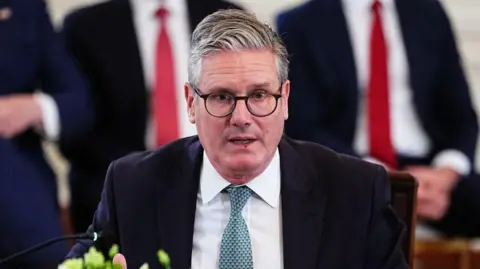Why Starmer wants No 10 rejig after a year in power
18 minutes agoHenry ZeffmanChief Political Correspondent

 Getty Images
Getty ImagesMany of the names involved in Sir Keir Starmer’s Downing Street shake-up are not even household names in Westminster.
But the latest moves, announced on Monday as MPs return to Parliament, are a big deal for several reasons.
First, in terms of organisational innovation.
If you’re struggling to recall who was Chief Secretary to the Prime Minister before Darren Jones, the answer is that there wasn’t one.
The role is a new creation, designed to give Sir Keir Starmer firmer command of the government machine he has complained is sluggish and unwieldy.
Bringing an MP into the heart of Downing Street’s operations is unusual, if not completely unprecedented – the Conservative MP Steve Barclay was Boris Johnson’s chief of staff in his final months as prime minister.
Clearer structures
For all that innovation, these latest moves are also partly about establishing more conventional – and clearer – structures.
This morning there were two directors of communications, and four people who could claim in some sense to be head of policy. Now there is one of each.
Reaching for the sort of football analogy the prime minister might enjoy, one government insider said to me: “No 10 has been like Sven [Goran-Eriksson’s] England team. Lots of midfield talent who couldn’t play together.”
The second significant thing about these changes is the ruthlessness.
This is a well-worn theme of Starmer’s leadership, but he is willing to demote, sideline or dispense with people who have served him very closely.
On the other hand, some of those being sidelined today were appointed not long ago at all by Starmer himself – so, to some of his Labour critics, ruthlessness is just a nice way of saying he is correcting his own errors.
Economic focus
Third, there is a pronounced focus throughout the changes on beefing up the economic know-how in 10 Downing Street. Jones has spent the past fourteen months as Rachel Reeves’s second in command.
The civil servant now running Starmer’s private office has spent his career at the Treasury. Baroness Shafik, the prime minister’s new chief economic adviser, is a former deputy governor of the Bank of England, among other illustrious qualifications.
This is a recognition that this autumn’s Budget will not just be a defining moment of the next few months but of this entire government, however long it lasts.
Some senior government figures are interpreting this as the prime minister wanting to take a bigger personal role in the discussions in the run-up to the Budget.
Those around Reeves say that she had been pushing for some time for Starmer to boost his economic team, and that she was heavily involved in discussions with the prime minister about the broader rejig of his staff.
Perhaps most importantly, this shake-up is significant for what it says about how Starmer himself sees his premiership having gone so far.
It is, implicitly, an admission that the first year and a bit of his tenure has not exactly gone to plan. And this is his attempt to ensure the next year and a bit goes a lot better.
The prescription is “delivery”. And it may well be that Jones and the rest of the re-tooled team are able to deliver on the prime minister’s priorities much more effectively than before.
Yet to many Labour MPs and advisers I speak to, the issue is more fundamental: they are not clear what the vision the prime minister wants his team to deliver is.
That is a question that only one person in Downing Street can ever answer.


Sign up for our Politics Essential newsletter to keep up with the inner workings of Westminster and beyond.